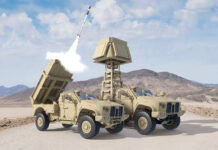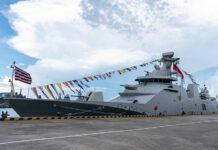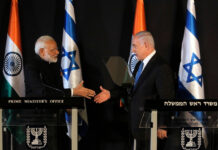In a unanimous vote 7 March, the United Nations’ Security Council agreed to initiate a round of far-reaching new sanctions against the secluded communist North Korean regime of Kim Jong-un in response to Pyongyang’s 12 February nuclear test.
The 15-member Security Council has been engaged in intense negotiations for the past few weeks with the United States working overtime to convince China of the need for a more comprehensive range of sanctions. China, as Pyongyang’s principal ally, did not exercise its veto power to prevent the sanctions from becoming effective.
Since 2006, the UN Security Council has implemented three rounds of sanctions against the North in an effort to restrain the reclusive nation’s repeated efforts to develop a nuclear-weapon’s capability and its efforts to produce an arsenal of ballistic missiles. For the most part, these previous sanctions have failed to curtail Pyongyang’s single-minded determination to be included among the elite few nuclear-capable nations.
This latest round of sanctions target Pyongyang’s cash flow in an effort to cripple the North’s access to financial sources that could be used to fund further development of nuclear devices and acquisition of ballistic-missile technology. It is hoped these new sanctions will prove successful in convincing the North to abandon its efforts to develop a nuclear capability.
North Korea, in years past, has devised ingenious techniques to thwart efforts to restrict the flow of funds into the reclusive regime. Bulk cash acquisitions have continued despite sanctions prohibiting such activities. The North has gone so far as to have agents obtain and deliver suitcases stuffed with currency. These “cash couriers” are believed to include North Korean diplomats.
UN Security Council Resolution 2094 includes articles that:
- Requires member nations to freeze or block financial transactions and services that could be used by the North to fund its nuclear and missile projects.
- Prohibits states from allowing the North to open bank branches in their territories if such institutions can be linked to prohibited activities or are found to be in violation of Security Council resolutions.
- Prohibits financial institutions of member states from opening offices in the North if their activities are suspected of contributing to Pyongyang’s prohibited programs.
- Expands financial sanctions to include bulk cash transfers, including funds carried by cash couriers, and encourages member nations to more closely monitor North Korean diplomats who may be engaging in prohibited activities.
- Requires member nations to enforce strict mandatory inspections of North Korean seaborne and airborne vessels that might be transporting suspicious cargo.
- Calls for member states to deny North Korean planes and ships access to ports and landing facilities should they refuse to be inspected.
- Clarifies the determination that brokerage services that contribute to the sale of arms to the North, including conventional arms, contained in existing sanctions remain in force.
- Bans the export of high-value jewelry, racecars, luxury autos, and yachts to North Korea.
- Bans a wide-range of trade agreements, including trade in export credits, if such agreements might contribute to Pyongyang’s nuclear program or ballistic-missile development.
- Requires member states to expel individuals working for North Korean companies included on the UN’s list of sanctioned companies from their territories.
In addition to these sanctions, the UN resolution also bans any further North Korean nuclear tests, rocket launches, and other activities that could be considered provocative. The UN also calls on Pyongyang to abide by the Nuclear Nonproliferation Treaty.
The resolution also names three individuals, The North’s Second Academy of Natural Sciences, and the Korea Complex Equipment Import Corporation to be added to the UN’s sanctioned list for their activities in support of Pyongyang’s prohibited missile and nuclear testing.
Immediately prior to the Security Council vote, an unidentified spokesman for the North’s Foreign Ministry warned on the regime’s state-owned Korean Central News Agency that Pyongyang was prepared to exercise its right to initiate “a preemptive nuclear attack to destroy the strongholds of the aggressors.”
North Korean Army General Kang Pyo Yong also entertained a crowd in Pyongyang numbering in the tens of thousands with a fiery speech that included a statement that the North was now prepared to launch long-range ballistic missiles that would engulf Washington, DC in a “sea of fire.”
Some unidentified sources are reporting that trains and buses in Pyongyang have been covered with camouflage netting in a move that adds to the tense situation. The North has also announced a no-fly order over the sea areas in the east and the west, has restricted seaborne traffic, and has placed restrictions on personal travel.
Pyongyang has also threatened to disavow the cease-fire agreement signed in 1953 that effectively ended the Korean Conflict. North Korea maintains an impressive arsenal of offensive combat forces near the Demilitarized Zone equipped with artillery and other heavy weapons that could strike South Korean and American forces with little warning.
While nearly all experts doubt Pyongyang has the ability to carry-out a missile strike against the United States, the intense rhetoric flowing from the North might be a prelude to future provocations that could push the Korean Peninsula a step closer to open warfare.
The new Security Council resolution, while being the most comprehensive to date, may not be enough to force North Korea’s leaders to abandon their nuclear and missile programs. The success of the new sanctions will depend largely on rigid enforcement by China. China’s leaders have publicly denounced the North and repeatedly claimed to adamantly oppose Pyongyang’s efforts to develop a nuclear-weapon’s capability.
Without a firm commitment from China, these new sanctions are unlikely to stop North Korea’s illicit activities. Even if the sanctions are wholeheartedly enforced, it remains quite likely that Kim Jong-un and the North’s ruling hierarchy will conduct more nuclear tests and will attempt future rocket launches until such time as a lack of funding cripples these efforts.
The most immediate concern is that the North will feel pressured enough to attack South Korea, an action that could escalate into a Peninsula-wide Second Korean Conflict. In the event such a situation did develop, China’s response would be critical.

















